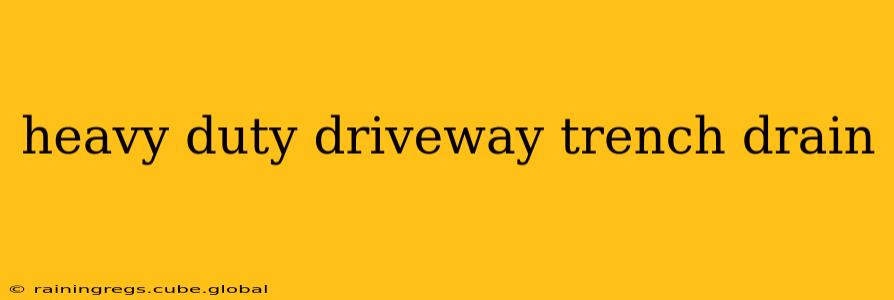Choosing the right driveway trench drain is crucial for managing stormwater effectively and preventing damage to your property. A heavy-duty system is especially important for high-traffic areas, preventing erosion, and ensuring longevity. This guide will explore everything you need to know about selecting and installing a heavy-duty driveway trench drain.
What Makes a Driveway Trench Drain "Heavy Duty"?
A heavy-duty driveway trench drain isn't just about the name; it signifies superior construction and materials designed to withstand significant loads and harsh conditions. Key characteristics include:
-
Material: Heavy-duty drains are typically constructed from robust materials like galvanized steel, aluminum, or high-density polyethylene (HDPE). These materials resist corrosion, impact, and UV degradation, ensuring a long lifespan even under heavy vehicle traffic. Some even feature reinforced concrete construction for exceptional strength.
-
Grating: The grating is critical. Heavy-duty systems often employ strong, reinforced steel grates capable of supporting heavy vehicles and preventing clogging. Look for grates with wide openings to maximize drainage efficiency while maintaining structural integrity.
-
Drainage Capacity: A truly heavy-duty drain boasts a high flow rate, capable of handling substantial volumes of water quickly and efficiently, preventing ponding on your driveway. This is vital in areas with intense rainfall or snowmelt.
-
Installation Design: Proper installation is key to the drain's performance. Heavy-duty systems often require a more robust base and precise grading to ensure optimal drainage and prevent settling.
What Size Trench Drain Do I Need for My Driveway?
Determining the appropriate size depends on several factors:
- Driveway size and slope: A larger driveway with a gentler slope will require a larger drain to handle the increased water volume. Steeper slopes can utilize smaller drains.
- Rainfall intensity: Areas with frequent heavy rainfall necessitate a larger drainage capacity.
- Vehicle traffic: Heavy vehicle use demands a drain with higher load-bearing capacity.
- Soil type: The type of soil and its drainage properties can influence the drain's required size and installation depth.
How Much Does a Heavy Duty Driveway Trench Drain Cost?
The cost varies significantly depending on the materials, length, features, and installation. Expect to pay anywhere from a few hundred dollars for a smaller, simpler system to several thousand dollars for a large, complex installation. Factors impacting cost include:
- Length of the drain: Longer drains naturally cost more.
- Materials: Steel and concrete are typically more expensive than plastic.
- Grating type: Steel grates are usually more expensive than plastic grates.
- Installation: Professional installation significantly adds to the overall expense.
How to Install a Heavy Duty Driveway Trench Drain?
While DIY installation is possible for some simpler systems, professional installation is highly recommended for heavy-duty drains. Improper installation can lead to drainage problems, structural damage, and void your warranty. A professional ensures proper grading, base preparation, and connection to the drainage system.
What are the Benefits of a Heavy Duty Driveway Trench Drain?
- Improved Drainage: Prevents water from pooling on your driveway, reducing the risk of damage and enhancing safety.
- Enhanced Curb Appeal: A well-maintained drain improves the overall look of your property.
- Erosion Control: Minimizes erosion by effectively directing water away from the driveway and surrounding areas.
- Protection from Damage: Prevents damage to the driveway from water damage and freeze-thaw cycles.
- Increased Property Value: A properly functioning drainage system adds value to your property.
How Often Should I Clean My Driveway Trench Drain?
Regular cleaning is vital for maintaining optimal performance. The frequency depends on factors like leaves, debris, and the amount of rainfall. As a general rule, inspect and clean your drain at least once or twice a year, more often if necessary.
Can I Use a Heavy Duty Driveway Trench Drain for Other Applications?
Yes, heavy-duty trench drains are versatile and can be used in a variety of applications beyond driveways, including:
- Parking lots: Ideal for managing stormwater runoff in commercial and residential parking areas.
- Patios and walkways: Prevents water accumulation and ensures safe passage.
- Landscaping: Effectively manages water flow in landscaped areas.
Choosing the right heavy-duty driveway trench drain requires careful consideration of your specific needs and conditions. Investing in a high-quality system ensures long-term performance, protecting your property and enhancing its value. Remember to always consult with a professional for guidance on sizing, installation, and maintenance.
